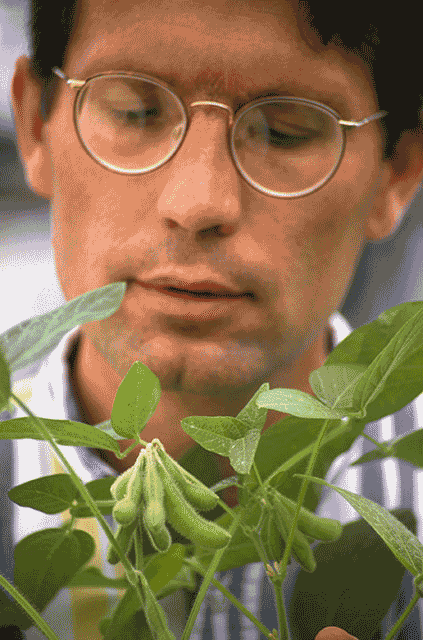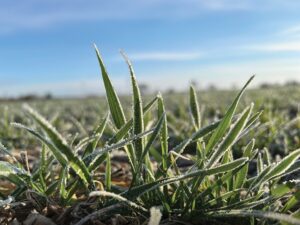Plant Breeders’ Rights explained
HOW THEY WORK AND WHY BREEDERS NEED THEM
MORE THAN TWO decades after they came to Canada, Plant Breeders’ Rights (PBR) still remain unclear to some farmers. But PBR are returning to the spotlight, thanks to the Trade Agreement discussions between Canada and the European Union (EU).

The Canadian Plant Breeders’ Rights Act was first established in August 1990 when Canada became a member of the International Union for the Protection of New Plant Varieties (UPOV). The Act was created to ensure breeders get a fair dollar for their work through royalties, while still allowing farmers to buy protected seed, grow it, save it for their own re-use in another year, and sell it for any purpose except as seed. Lorne Hadley works for the Canadian Plant Technology Agency, which educates farmers about PBR and investigates cases of rights infringement. Hadley says most of his investigative work happens in western Canada, where farmer to farmer trade is most prevalent, but says all farmers need to be sure they are getting their seed from a licensed dealer – otherwise hardworking plant breeders may not be getting paid.
THE RULES
“Farmers should be checking to make sure the seed grower they’re buying from really has the right to sell the product he’s selling,” simply states Hadley. “If you have someone who wants to sell you a product, but won’t put the variety on the invoice and doesn’t advertise that they have it for sale, you need to be a little suspicious.”
In other words, just because a farmer is not asked to sign a technology use agreement, does not mean that seed does not have some intellectual property protection. PBR were designed to offer farmers more flexibility, especially in Canada where the rules are more relaxed than in most developed countries, but leniency is scaring off potential investors. In 2012, the private sector invested $99.5 million in plant breeding and variety development but only six percent was in PBR protected wheat, 1.2 percent in flax, and 0.2 percent in pulse crops. Todd Hyra, Western Business Manager for SeCan, says all breeders need the same level playing field for farmers to get the best products possible.
“To have access to the best genetics in the world, Canadian producers have to provide an environment that encourages these companies,” said Hyra. “We want to support bright individuals who are willing to risk their future on the fact that producers want to buy what they produce.”
THE PLANT BREEDERS
Some of the bright individuals Hyra is referring to are Nathalie Lanoie and her brother Dominique in St-Hugues, Quebec who own and operate a small company called Céréla. Since the Lanoies bought the business from Nevico in 2010, the main focus of the company has been genetic improvement. By leaving the commercialization and distribution of the seed to top bidders like SeCan, income for them mainly comes from royalties. Lanoie says return on investment can be long awaited and is far from guaranteed.
“From the first cross of parent material to the registration of the new variety, our whole process takes eight to 12 years of investment,” she explains. “Cereal royalties are between two to four dollars per acre and if famers don’t buy certified seed, companies like ours can’t survive.”
Considering that Canadian farmers seeded 26.4 million wheat acres for harvest in 2013, the market potential for breeding companies is attractive at first. But since most acres were not supplied by certified seed sales, both Hadley and Hyra warn international breeders will remain hard to attract and private researchers will struggle. Lanoie herself says she finds it especially frustrating when she has to abandon opportunities because her funding did not come through or she is forced to operate in a way that she knows is not the most efficient for her business.
“For example, each year I do a nursery for Fusarium and if I could be sure I would have the money, I would buy the machine that tests for DON toxins in the grain but I can only afford to select some varieties because we can’t be sure of revenue,” she says. “If I had more money, I could test all my lines cheaper myself than it costs just to send some away.”
Seed companies, large and small, have recently appealed to the federal Minister of Agriculture to include amending PBR legislation up to the same standards seen in EU countries as part of a future trade agreement. The European Seed Association has also expressed concern about Canada’s outdated legislation and has identified the current statute as a barrier to trade.
More information on PBR can be found at: www.inspection.gc.ca, from the ‘Plant’ drop down menu select ‘Plant Breeders’ Rights’.
PLANT BREEDERS’ RIGHTS IN COURT
In early October, SeCan resolved legal action taken against Leonard Junop and Junop Bros Seed of Delisle, Saskatchewan for infringement of Plant Breeders’ Rights (PBR). The case involved the illegal sale of PBR protected malt barley varieties AC Metcalfe and CDC Copeland. In the end, Junop Bros were not only forced to stop selling these protected varieties in the future, but had to repay $120,000 in damages. SeCan says the money will be used to pay royalties owing to the respective plant breeders who developed AC Metcalfe and CDC Copeland in the first place and the balance of the money will be invested in future variety development.
“For many products, it’s OK to farm saved seed,” Todd Hyra, Western Business Manager with SeCan, emphasized. “The difference in this particular case is that they were selling seed.”
Fortunately, settling PBR issues rarely goes all the way to court. There appear to be very few PBR cases world-wide (the UPOV only offers four references of legal precedents) and the general consensus seems to be that most infringement cases can be settled out of court.
http://www.acip.gov.au/reviews/issues-enforcement-pbr/.
UPDATE:
MEDIA RELEASE – PBR Issue Resolved
Ottawa, ON – December 16, 2013 – SeCan and Gary Christianson and Eastway Holdings of Naicam, Saskatchewan have agreed to a settlement to resolve a legal action SeCan commenced for infringement of its Plant Breeders’ Rights (PBR) in midge tolerant wheat variety AC® Unity VB.
“This case was particularly important” noted Todd Hyra, Business Manager Western Canada for SeCan. Not only is AC® Unity VB PBR protected, it is one of several midge tolerant wheat varieties sold with a stewardship agreement to protect the technology. Without stewardship, the midge could overcome the tolerance, leaving wheat producers without this valuable tool to reduce losses from the pest.”
A recent survey found 93% of midge tolerant wheat customers feel it is critical to have a stewardship program in place to ensure the effective life of the midge tolerance gene is protected. “It is clear from customers’ feedback that they value the technology,” added Hyra.
SeCan works with the Canadian Plant Technology Agency (CPTA) to search out, investigate, and take all necessary action against all infringers of plant-related intellectual property.
Lorne Hadley, Executive Director of the CPTA said, “Under PBR, producers are allowed to save their own seed. The midge tolerant wheat stewardship agreement allows only one generation of farm-saved seed past certified. The distributors of this technology have been charged with the responsibility of protecting midge tolerance. Though the CPTA, members will continue to educate, audit, monitor and when necessary, enforce both the PBR and the Midge Tolerant Wheat Stewardship Agreement.”
As an association of over 700 private independent seed businesses, SeCan seeks to enhance Canada’s plant breeding capacity through public-private partnerships. “Midge tolerant wheat was a result of one of these partnerships,” says Hyra. SeCan was involved in funding the early development of midge tolerant wheat. “It took over 15 years and millions of dollars to develop the midge tolerance trait – there are no additional midge tolerance traits waiting in the wings – we need to make this one last.”
– 30 –
About SeCan: As “Canada’s Seed Partner”, SeCan actively seeks partnerships that promote success in Canadian agriculture. SeCan is the largest supplier of certified seed to Canadian farmers with more than 700 member companies from coast to coast engaged in seed production, processing and marketing. Since its inception in 1976, SeCan has been a major supporter of plant breeding in Canada, returning more than $77 million in royalties and research funding. SeCan represents more than 430 crop varieties developed by public and private sector breeding programs.
About CPTA: The Canadian Plant Technology Agency is an industry-driven organization established to protect intellectual property rights pertaining to crop development. The CPTA also works to raise awareness of plant property rights.
For more information, contact:
SeCan
Todd Hyra
204.489.9126
Canadian Plant Technology Agency
Lorne Hadley
306.227.7161 •
























